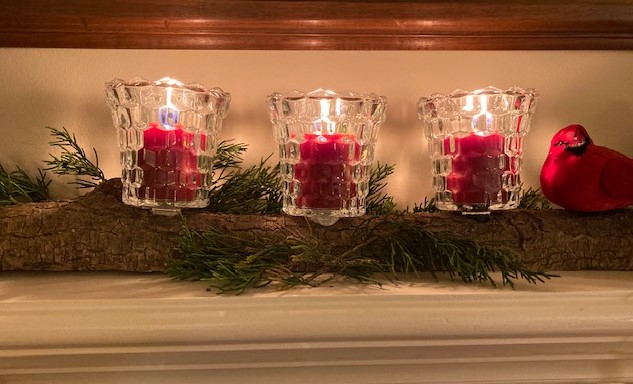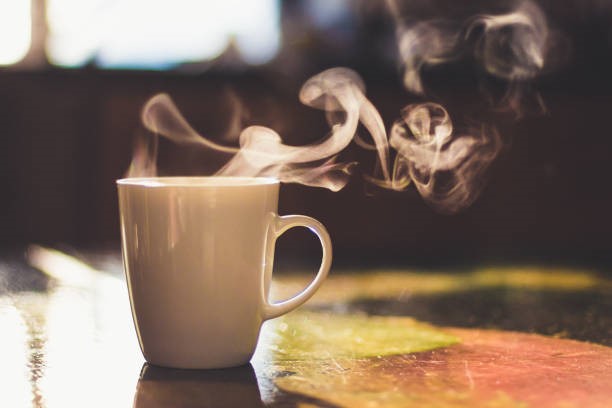A Ritual of Friendship

This is a season of the year crammed full of ritual—not just the churchy kind, although there is plenty of that, but many other customs and tradition that we perform faithfully and in the same way year after year. The little word the is often an indicator. We put up, not a tree, but the tree, we put up the lights, we roast the Christmas turkey or ham. These activities may not completely fulfill the definition of ritual, but they come close for many of us. The sigh of satisfaction when the tasks are completed, the need to sit and take in the result, the sense of goodness or joy. These acts transform ordinary time into something more.
Thinking about all of this, I was reminded of another ritual I have participated in for years, not only at Christmas, but throughout the year. It is one I miss since moving to Harrisonburg. Here is what I wrote about it in November of 2015:
Not everything was in order when I walked into Panera for my monthly breakfast with Linnea. “Our table” beside the gas fireplace was already taken, and there was no fire burning on this frosty morning. I know the table isn’t ours, but we sit there so regularly it feels like it ought to be waiting for us as part of our monthly ritual. Linnea wasn’t there yet, but I saw Jim in his usual spot and nodded to him. After ordering my food I asked if the fire could be lit and put down my note book and coat at another table nearby. While I was filling my coffee cup Linnea arrived.

We have been getting together for years, not always here, but nearly always over food. Although we see each other at various times and places in addition, these monthly meals have become a sustaining ritual in our lives.
We attended seminary together, almost 30 years ago. I don’t remember meeting her, just that she was one of the class, one of the many people I didn’t know in a strange setting. At first we weren’t particularly close friends. We came from different backgrounds and had different professional experiences, but we were both married which meant we didn’t live in the dorm. We disappeared after classes, going home to husbands and children. We became part of an eclectic assortment of women trying to maintain a precarious balance between home and school, and that commonality drew us together.
After seminary we each went our separate ways, but we both lived in Northern Virginia and somewhere in that intricate web of interrelations, we found each other again. I invited her to join a clergy women’s group I was part of. Then there were clergy women lunches that slowly worked down to being just her and me. Those lunches shifted to breakfasts and have become a solid support in my life. While our regularity is spotty due to busy schedules, our meetings have seen us through job changes, challenges, and retirement; the marriages of children and then the divorces that ended some of those marriages; the births of grandchildren; the ups and downs of children’s careers, their health concerns; the deaths of friends or their spouses. We have weathered presidential elections and ecclesiastical earth quakes, reported on travels and recommended books to each other. We haven’t shared recipes or shopping bargains or sermon notes, although I have done presentations for groups at Linnea’s church, and she has referred clients to me.
Our times together have the feeling of carefully choreographed ritual. I, who live nearby, usually arrive first and order my coffee and pastry. Then Linnea comes rushing in with her commuter traffic report. She orders cappuccino and we set down at our table by the fire. We talk. At the end Linnea—it is almost always Linnea, says, “Well, I hate to say this but I’ve got to go.” We set a date for our next breakfast, hug each other, and go our separate ways, always refreshed.
The dictionary defines ritual as “a sequence of activities involving gestures, words, and objects, performed in a sequestered place, and performed according to set sequence.” That describes our breakfasts. It explains my sense that all is not well when “our table” isn’t available.
But ritual doesn’t depend just on place. It is also the gestures, words, and objects—our greeting and farewell, our conversation, and the food we eat. I see it as a holy time, even though we often laugh, and talk sometimes about trivial things. We may even be irreverent.
Ritual has transformative power. For Linnea and me our breakfasts have transformed a casual acquaintance into strong friendship. It has deepened our lives, and proven itself a safe haven for trying out ideas and talking about personal concerns
Ritual practices convey or embody a reality or truth that is otherwise difficult to put into words. It becomes a container for something much larger than those who participate. I know we feel that as we patiently, month after month, make our way through the obstacle course of our calendars to find a next meeting time. We don’t need to put into words its importance. That we make time for it is indication enough.
Back to the present—2021, a chilly November morning, this time at a Starbucks in Haymarket, the most convenient place for us to meet. Little has changed except that we arrive in the parking lot at the same time and walk in together, putting on our masks almost in unison. No fire to sit near, in fact a rather drab interior, but we pay little attention to it. We are together and have catching up to do. We’ve seen each other a few times since my move, but this had been the long Covid stretch. Our meeting feels past due.
We catch each other up on family and personal events, and talk about mutual friends. Then we brainstorm together about a project I’m working on, Linnea as enthusiastic as I, even though it’s my project. It feels like we had never been apart. As usual, Linnea looks at her watch and says, “I really hate to say this, but I’ve got to go.” Not quite a benediction or blessing, but it holds within it the blessing of promise. We have just figured out when we can meet again. We put on our masks (a new part of the ritual), hug, and say goodbye, and I drive off for the rest of my day, feeling lighter than when I came. Once again, our ritual has enriched and energized me.
What are rituals that sustain your life?
I love this, Kathie. It reminds me of the South African proverb: “I am because we are; we are because I am.” Thanks, Annetta
Thanks, Annetta. That is a great proverb. Friendships are a valuable and necessary part of life, I find. When I think of my friends I feel rich beyond measure. Thanks for being one of them.
This resonates with me: I have a friend who does not even live very far from me yet, even in retirement, we do not see each other as often as we would like to. Over the past thirty years or so, we have developed a ritual for catching up that always starts with tea and nearly always ends with a glass of wine … sometimes it might include a walk … occasionally we have a meal together. It is the sharing with understanding that makes or friendship so special: no need to explain anything; we are there to celebrate, to commiserate, to ponder or to help. We know we are there for each other – actually anytime.
Thanks for your comments, Anne. It is a gift to have friends like that, isn’t it? I take it from the things you write about and the pictures you post that you live in South Africa. That is a beautiful country containing an amazing variety of landscapes from the lush to be barren, mountains to beaches and everything in between. We traveled there multiple times during our years in Botswana, and were back to visit again when my sister spent a year in Durban. I’d love to travel there again, but it doesn’t look likely in the near future.
More’s the pity … until either the pandemic disappears or we get used to it like the ‘flu. I am pleased to know you have been here before.